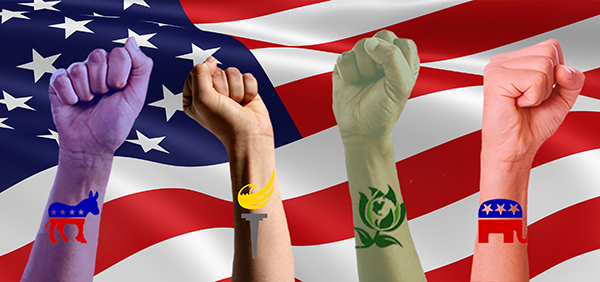Election results spark political discourse

Graphic by Rachel Nwia
December 16, 2016
Republican candidate Donald Trump won the 2016 presidential election against Democratic candidate Hillary Clinton and was elected the 45th president of the United States on Nov. 9. This surprised 82 percent of 270 students in a nonscientific Oracle survey who said they thought Clinton would win the election. 17 percent of students thought Trump would come out with a victory.
According to the Independent, though Clinton won the popular vote by 2.7 million votes, Trump won the presidency by gaining 306 electoral college votes. Clinton received 232 of the electoral college votes. Junior Alex Economou was part of the 82 percent of people that thought Clinton would win.
“I actually found it shocking [that Trump won] because I thought [the] U.S. was more progressive, but I guess we’re not as progressive as I thought we were,” Economou said.
Due to the close election, there are differing opinions regarding Trump’s presidency. Sophomore Georgette Tsagaris expressed her mixed opinions on the result.
“I’m happy in one sense because I didn’t want Hillary to be [the] first woman president, and then I’m sad in another because we have [Trump] in office,” Tsagaris said.
Senior Lauren Luckey described her reaction upon learning the results of the election. Luckey said she was happy that Trump won.
“I think [Trump] has more to offer the country than Hillary did,” Luckey said. “Contrary to what most people believed, he won despite all of the negative media attention.”
According to Stacy Flannery, US History and Eastern Religions teacher, she acted as a guide for students through the election rather than persuading them with her own views.
“I always tell my students, ‘I’m not trying to tell you what to think, I’m trying to teach you how to think’,” Flannery said. “As soon as I start putting my own political beliefs out there, I have abandoned that value.”
Senior Isabel Spingola believes that some reactions regarding Trump’s victory are inappropriate and not the way to move forward as a country.
“Everyone has been saying ‘Not My President’, but I believe that when people say that, [it’s] going to make our world a dangerous place to live in,” Spingola said. “Because if they resist having him as the president, […] that makes our country vulnerable to attack […] Now we have to find a way to band together.”
Flannery agrees with Spingola; the only way our nation can move forward is by working to understand the other side. According to Flannery, people who are resentful towards those who supported a different candidate than their own should instead be respecting each person’s personal opinion.
“I made it clear to [my students] that no matter who won that night, half the country was going to wake up happy and elated about the direction the country would now go in and the other half of the country would wake up very unhappy and potentially stunned,” Flannery explained.
Luckey also agreed with Spingola and Flannery. She also acknowledged that the President-Elect has made some disparaging and controversial comments but believes that the media played a huge role in portraying him as a negative figure.
“I believe the protests are completely outrageous,” Luckey said. “I believe that the media [played] a huge role in the instigation of these protests. The media found it easy to pick out his weaknesses. And people listen to it without even having time to formulate their own opinions about him first.”
Tsagaris also thinks the protests against Trump are unacceptable and believes that the people must accept the results.
“It’s like you don’t like the fact that somebody moved into your house so you destroy your house, that doesn’t make sense [because] it’s still yours,” Tsagaris said. “You can’t just destroy things because you don’t agree with [the election results]. What you have to do is think about the future and come up with plans so that this doesn’t happen again. Because what’s done is done; he’s our president.”
However, junior Riley Alexander emphasized the importance of the first amendment rights and the people’s voice.
“I think that because we’re a nation that’s not a monarchy, we don’t have to have automatic deference to a president,” Alexander said. “He didn’t win the popular vote, and he’s claimed that he will implement policies that will affect a large population of the American people, and [the people are] rightfully upset. And they have the first amendment right to [freedom of speech and to assemble].”
According to Spingola, people need to give Trump a chance before jumping to negative conclusions about the future.
“I think people are jumping to a lot of conclusions as to what is going to happen in the next four years, and …that our country is going to go downhill, but I just think that everyone needs to just wait it out,” Spingola said.
Principal Lauren Fagel hopes that after this election students and staff will go back to focusing on their community and realize the power of voting.
“I think overall people are just going to settle in and we’re just going to go back to caring more about our world right here in Glenview,” Fagel said. “I hope that what kids are taking away [is] voting really matters. […] It’s important to fight for what you care for.”


